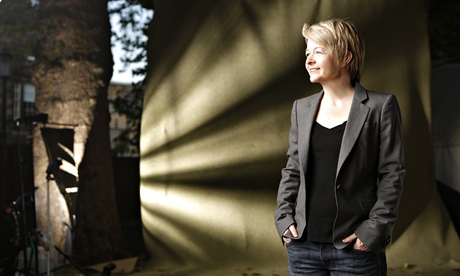
Sarah Waters is renowned for transgression. Whether setting lesbian relationships centre stage (still unusual, though less shocking these days), modernising an established genre (Dickensian potboiler in Fingersmith; country-house ghost story in The Little Stranger; gothic thriller in Affinity), or experimenting structurally (the second world war drama The Night Watch is told backwards), she is not afraid to play with her readers' expectations. However, she never loses control of her material, allowing us the thrill of going off piste with her while knowing we will get down in one piece.
The Paying Guests is another wild ride of a novel. Divided into a love story and a crime drama, the two parts are separated by 35 of the grisliest pages I have read in some time. This shift requires some readjustment for the reader, but Waters is so confident – and, line by line, her writing so beautiful, precise and polished – that she sweeps all before her. I succumbed.
It is 1922, and Frances Wray and her mother live in genteel poverty in a south London house. Frances's father and two brothers, all of whom died during the Great War, have left behind debts. At a time when it is difficult for a middle-class woman to work, Frances has had to take on the housekeeping rather than employ a maid. A young woman of her class is not meant to be boiling eggs, laying fires, emptying chamber pots, and she goes to great lengths to shield her frail mother and friends and neighbours from having to witness her perform such menial tasks. Frances's life is one of constant drudgery, punctuated by visits with her mother to the cinema every Wednesday, the weekly trip up to "Town", and the nightly cigarette sneaked in her bedroom.
Waters is particularly good at building up the details of domesticity in an age when there were not yet the labour-saving devices to make it easier and less time-consuming. Frances battles against dust and grime, beating carpets and cushions, dusting furniture, sweeping the stairs and scrubbing the floor with vinegar: "There! How pleasing each glossy tile was. The gloss would fade in about five minutes as the surface dried; but everything faded. The vital thing was to make the most of the moments of brightness. There was no point dwelling on the scuffs."
To make ends meet, the Wrays decide to take in lodgers, or "paying guests", and Leonard and Lilian Barber move in. A young couple of the "clerk" class – a clear step below the Wrays, whatever their reduced circumstances – their sudden presence in the house is unsettling. Leonard is brash and arrogant, and enjoys flirting with Frances to make her uncomfortable. Lilian wears a "gipsyish" fringed skirt and Turkish slippers, and plays at keeping house, sleeping in and overloading their rooms with tchotchkes, ostrich feathers and macramé.
The first half of the novel concerns Frances's developing relationship with the Barbers, moving from the oddity of hearing strangers in the house and awkward meetings on the landing to tentative socialising and the beginning of a surprising intimacy with Lilian.
This being a Waters novel, it is clear where such an intimacy is headed: "They smiled at each other across the table, and some sort of shift occurred between them. There was a quickening, a livening – Frances could think of nothing to compare it with save some culinary process. It was like the white of an egg growing pearly in hot water, a milk sauce thickening in the pan."
Frances has transgressed in the past, with a young woman who now lives with another woman in central London, reminiscent of same-sex couples Waters described in The Night Watch. Rather than go down that route, Frances chose to remain with her scandalised family and to look after her widowed mother – to "settle into your role", as she is horrified to hear a family friend put it. Now, unexpectedly, she has a second chance.
The growth of Frances and Lilian's relationship is exquisitely handled, and includes detailed set-pieces such as an afternoon "rinking" – rollerskating – and the most eyebrow-raising game of Snakes and Ladders you will ever come across. If you have ever wondered how sex works between women, The Paying Guests answers it unblinkingly, without being squeamish or embarrassing to read, as sex on the page so often is.
Then comes the horror: a two-punch shocker that shoves the novel into a completely different genre. Waters keeps a tight grip throughout, maintaining her careful, evocative similes even when depicting gore. The contents of an abortion at the bottom of a lavatory pan are "dark as black treacle". A head "lolled in her hands, as heavy and uncontrolled as a cabbage in a string bag". I made the mistake of stopping my night's reading in the middle of this section, and slept badly.
The rest of the novel is more conventional, segueing into a crime novel, including the kind of police interviews and courtroom scenes that make you cover the page so you don't accidentally read ahead. Frances and Lilian are physically separated, and the fragile bond they had established is stretched to breaking point.
This part is perhaps more sketchily written than the first, but it may simply be that I was reading faster, helplessly pulled along by the magnetic storytelling. Twice in the last few pages I shouted aloud – though whether in joy or horror I will not tell you. Sarah Waters skilfully keeps you guessing to the end.
The Paying Guests is published by Virago (£20). Click here to buy it for £17

